A wake up call to the great divide between the many faces of a country, and what tourists do and do not see, in Thall, Pakistan.
As tourists and travelers, we barely scratch the surface of the countries we visit, though we like to think otherwise.
Consider your own country for a moment; how little a visitor would understand it after only visiting a handful of famous sights, or speaking with locals for a moment or two. They’d only have a feel for the tip of the iceberg… if even.
We come to this realization in Pakistan often. There’s a massive disparity in this country between the rich and the poor, men and women, but it’s not something we’re truly confronted by often.
Because we speak English, our friends throughout the country are inevitably affluent. They’re well educated enough to converse with us on a deeper level, and well off enough to relate to us in terms of lifestyle. Our Pakistani followers are much the same: equal amounts of men and women educated enough to speak decent English, and mostly wealthy enough to have some kind of interest in travel.
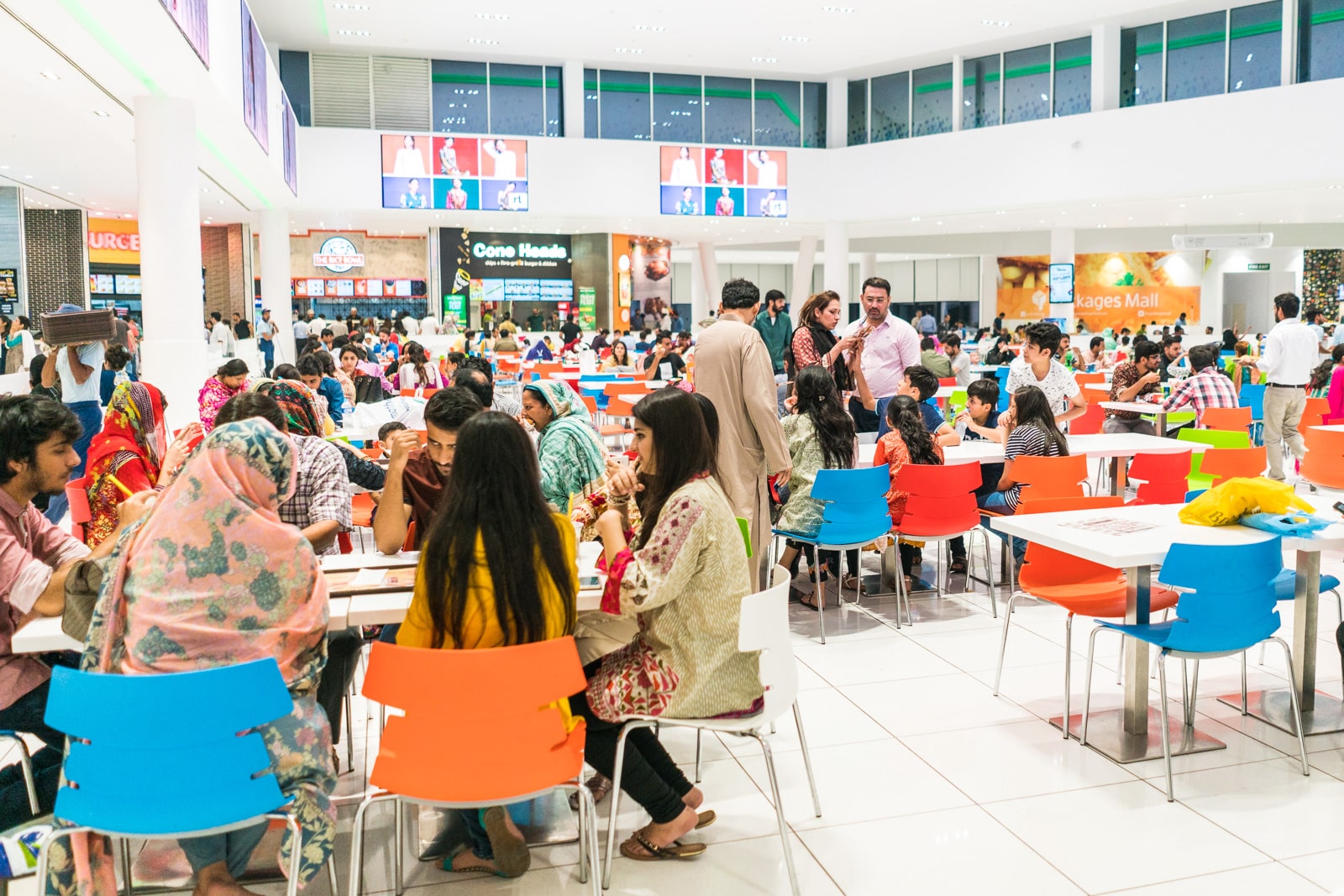
Malls in Lahore: boys and girls hanging out together, heads uncovered, western clothes, chic food outlets. This is a developing country?
In the cities, we ride around in Ubers and Careems, meet boys and girls at malls, and are taken to meals at fancy—often Western—restaurants. I rarely cover my head, and sometimes go without wearing a dupatta in urban areas. Sebastiaan is able to freely converse and snap selfies with the women we meet.
Our lives are usually quite comfortable in Pakistan, which makes the niggling feeling of guilt in the back of my mind that much more pronounced. We are, much of the time, traveling in a bubble—this is not how the majority of Pakistan’s population lives, despite some of our friends’ and followers’ claims.
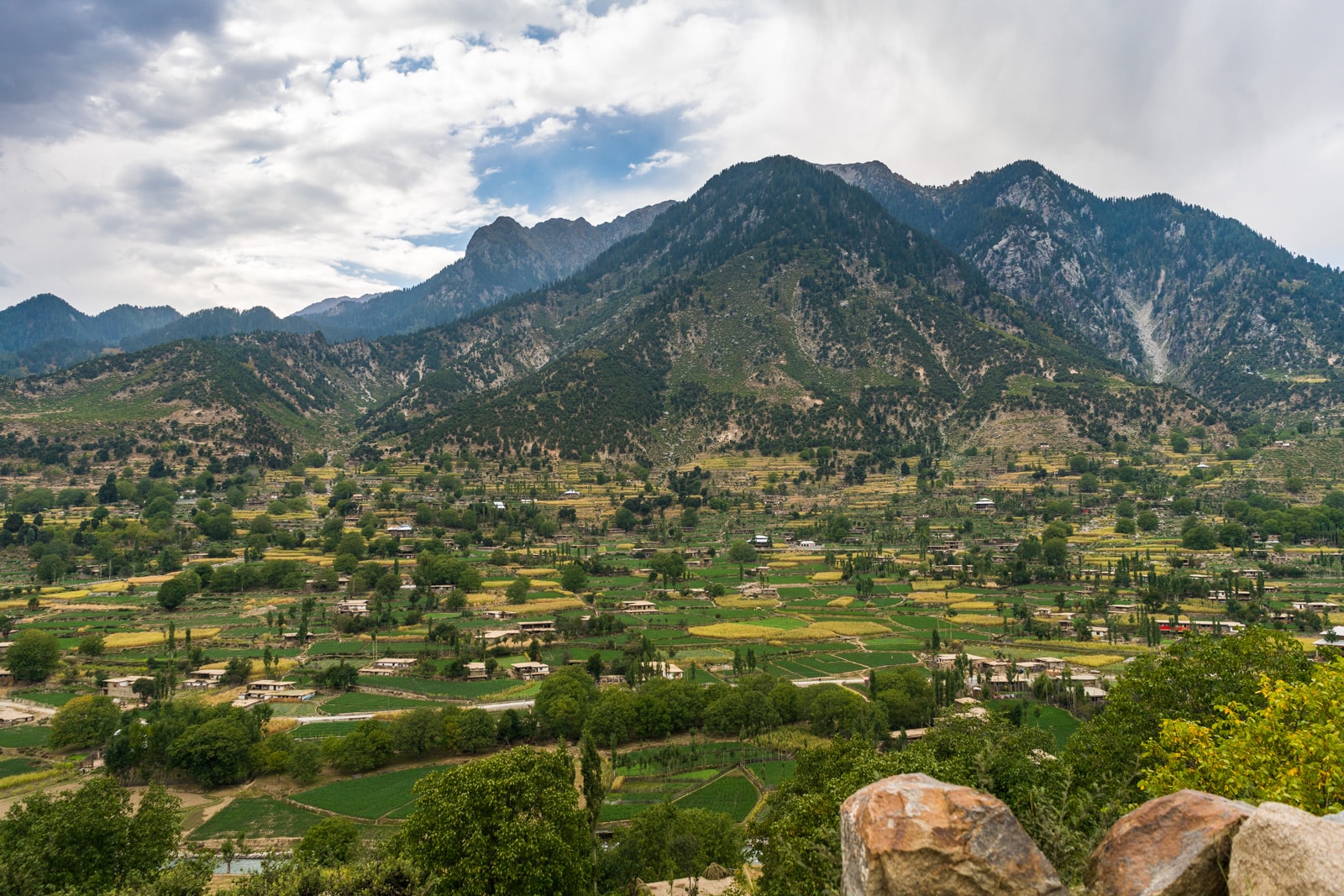
Thall, Pakistan
Another side of Pakistan
Several days ago, we drove into the village of Thall in Khyber Pakhtunkhwa province… and were instantly struck by a reminder of this great divide.
Far removed from glitzy malls filled with girls in tight Western clothes in Karachi and Lahore, the women of Thall walked dirt streets lined with stone and wood houses while swathed in black. Rather than the embroidered burqas made famous by Afghanistan, or the formless black burqas donned primarily by Arab women, all of Thall’s women had simple black sheets draped over their body and face. The sheets had no opening for their eyes, and so the women floated through the streets like faceless black ghosts.
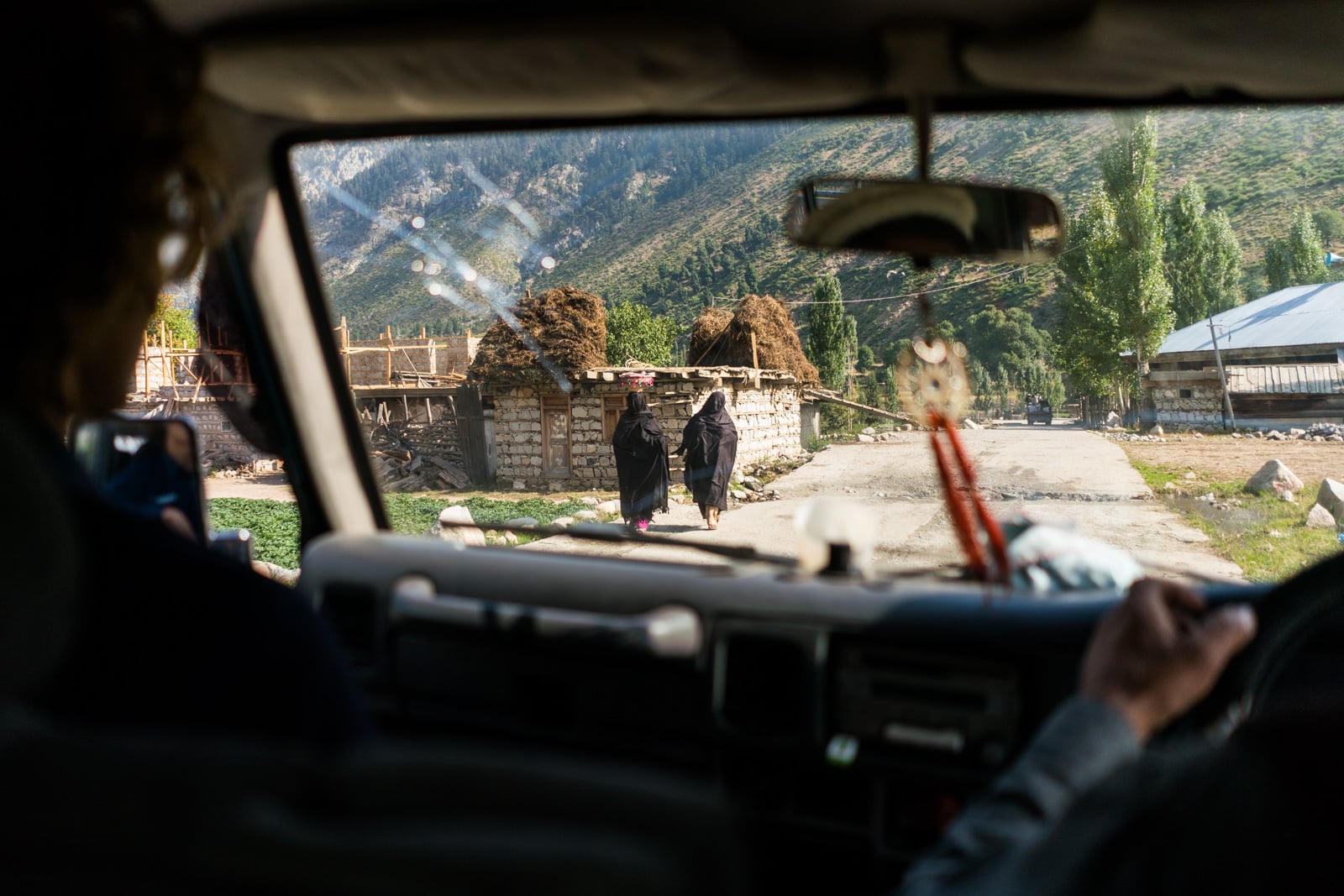
The ghosts of Thall
This was not the first—nor the last—time we found ourselves amongst women completely covered in the name of purdah, modesty.
Blue burqas were ubiquitous in our Afghanistan travels, and the same style of burqa is found all throughout Pashtun Khyber Pakhtunkhwa province in a variety of colors. I’ve grown as accustomed to the covering as I’ll ever be, and it was easier to do than I’d like to admit. Shame me as you will, but it’s not unlike the way many of us are desensitized to images of starving Ethiopian children or underage Indian mothers on the television; we know they exist, and feel a semblance of sadness, but we’ve seen them so many times that they’re no longer noteworthy. They’re simply a world apart.
In the same way, I find it dangerously easy to forget that under each faceless burqa or sheet is a complex woman with her own story and struggles in life.
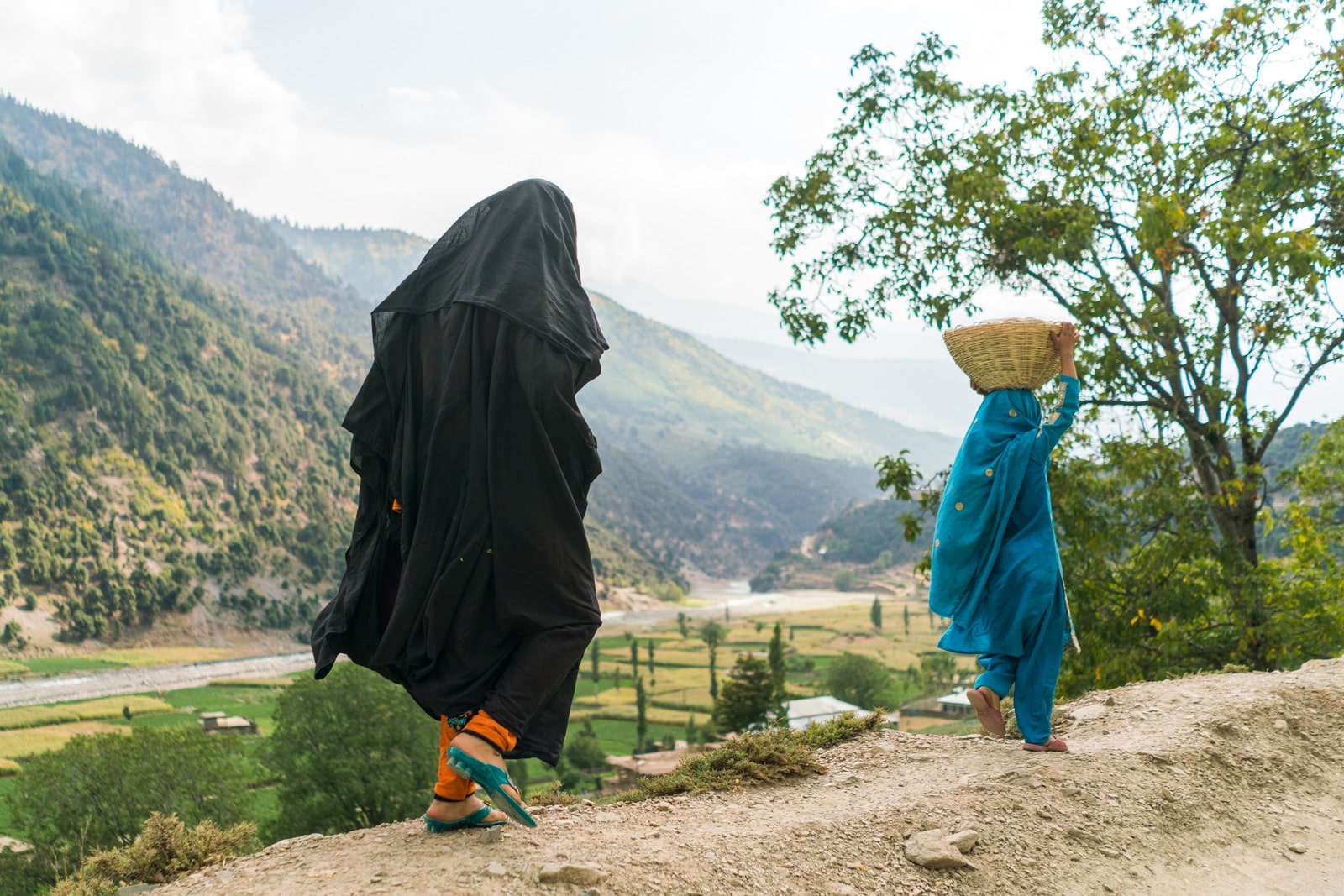
Lady in black
That is, until we spent time in Thall. There, for the first time, I had a chance to meet and interact with the women underneath the veils, to spend time beyond the literal and figurative curtains that divide the men and women’s worlds in this region.
Behind the curtain, beneath the veil
Bakht drove the shared Jeep from Swat Valley to Thall. He was a small, mustachioed man sporting a gray vest and white Pashtun pakol, with an ID card in his wallet that proclaimed him a “Peasant Worker”. He seemed quite jolly, despite speaking only basic English.
Upon our arrival in Thall, he invited us to stay in his home. The building was divided into two sections: one living area hidden behind a curtained doorway, and another area for guests. Bakht sat with us and watched TV in the guest area, his two small sons occasionally bringing us tea and snacks as we switched between English Al Jazeera news, Indian soap operas, and the Japanese NHK channel. No signs of life came from the other side of his house.
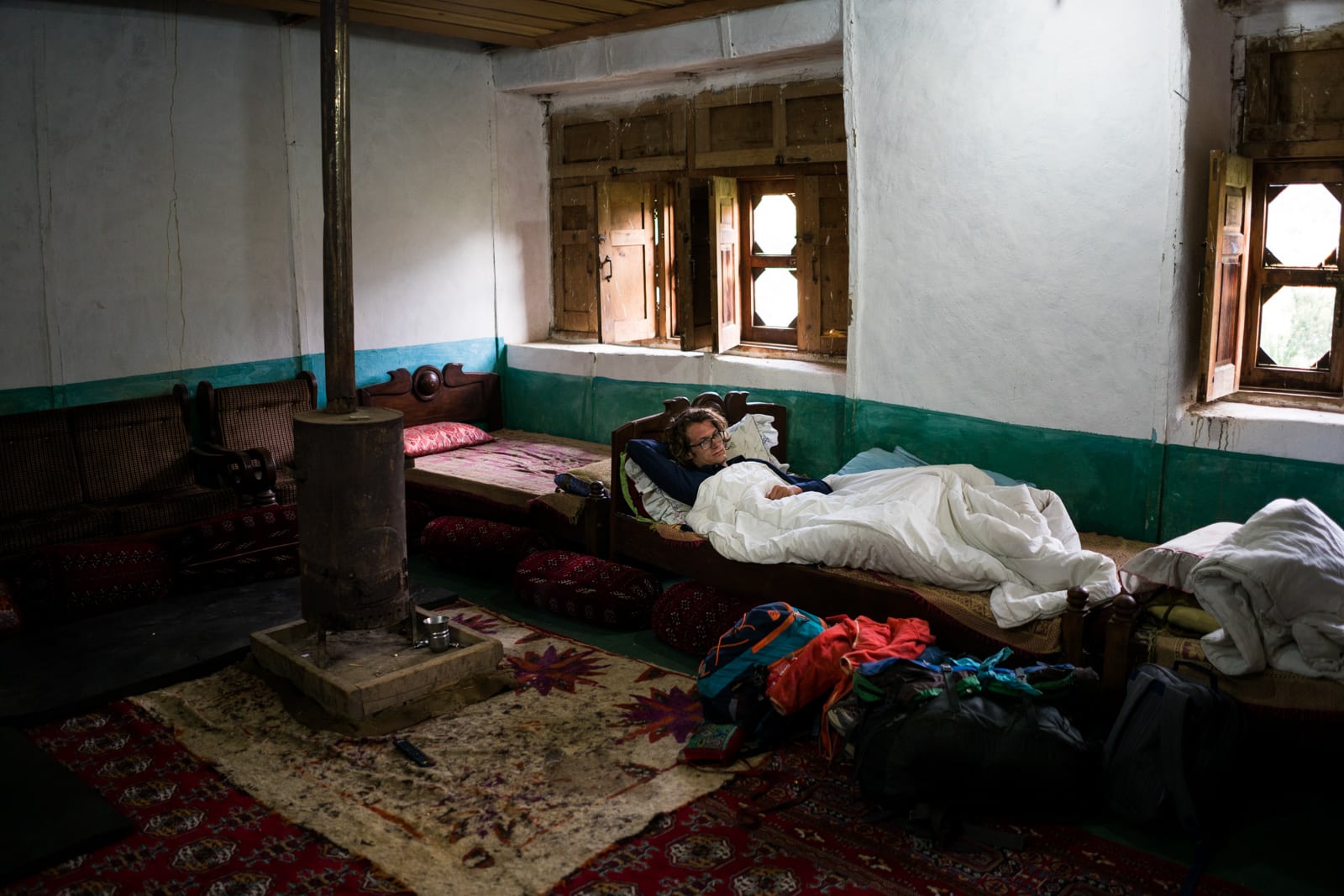
Guests only
Eventually, Bakht stepped out for a moment. Within minutes of his departure, a young girl of 12 or 13 stood in the doorway of our room, beckoning for me to join her. Big brown eyes stared pointedly at me, and braided brown hair peeked out from underneath her red velvet hijab. I got up to see what she wanted, and she grabbed my hand in a vice grip, forcibly steering me into the living area behind the curtain.
Curious eyes of at least ten women and children greeted me from the other side. In the span of a few seconds, they all surrounded me. The young girl who brought me there introduced herself by taking a pen and carefully printing her name on my hand in crude letters: Z A i N A B.
Zainab began interrogating me with questions in Kohistani, the local language, at a rapid fire pace. All I could do was shrug and smile as the other women cackled at my cluelessness and my inability to speak Urdu.
While I deflected the Kohistani inquisition, more and more women stepped through the back door of the house. They entered as faceless black ghosts, but quickly pulled off their cloaks to reveal beautiful people underneath. There were aquiline noses and hooked noses, dyed red hair and pitch black hair, piercing blue eyes and deep hazel eyes. The women were stunning both in appearance and in diversity; their only unifying aesthetic were the black cloaks hanging around their shoulders.
Fireballs
Contrary to my mental image of local women as silent and demure, these women were definitively feisty.
They pulled off my headscarf to examine my hair, clicked their tongues at my woefully unruly eyebrows, snapped my bra to check its make, and fondled my breasts to see how big they were (they were disappointed). Upon learning that I had no children—“Bachha nehi”, no children, I tried—one girl frowned. She repeatedly asked me if Sebastiaan and I had sex, using a violent fisting motion between my legs to make sure she got her point across. Another girl rifled through my bag, looking for any and all entertainment.
Upon finding my mobile, the crowd of ladies pulled closer together as they insisted I flick through all the photos on my phone. Uninterested in our Instagram photos, they were far more intrigued by photos of Sebastiaan, and an old photo of me and my best friend standing with my mother in sleeveless dresses. The girls zoomed in on our bare arms and my open chest, discussing amongst themselves as they experimented with pulling up their own sleeves and peering down my kurta to see if my breasts looked the same as in the photo.
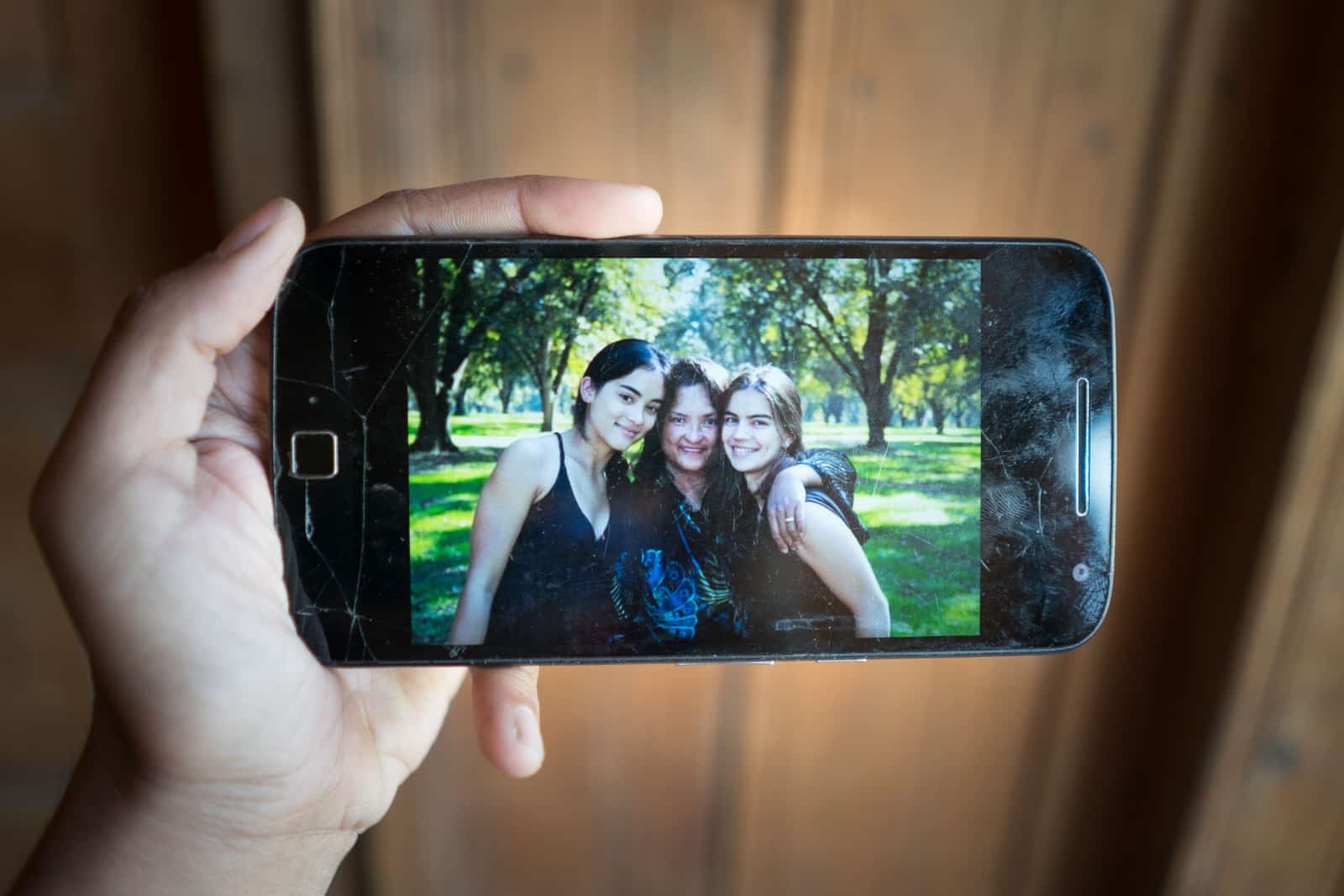
Scandalous!
As the women scrolled through my photos, Zainab continued to shoot questions at me. Realizing that Kohistani questions would get her nowhere, she switched gears, and began asking me how to say certain words in English. She was a quick learner, and repeated the words under her breath like a mantra for the rest of the evening: “Boobs. Nipple. Flower. Brrra. Husband. Ba-gina.”
Eventually, the circus got on the road, and I was paraded around the neighboring houses to the delight and amusement of the neighbors. Behind each door were far more women, young girls, and half naked babies than I ever imagined.
In one house, the girls shook their heads over my thigh-length kurta, saying it was far too short for Kohistani women. In another, one of the girls filled up a clay water jug and placed it on my head. My neck crumpled almost instantly, and the girl, laughing, moved it from my head to hers, grinning as she showed off how easily she could walk with it. No hands necessary.
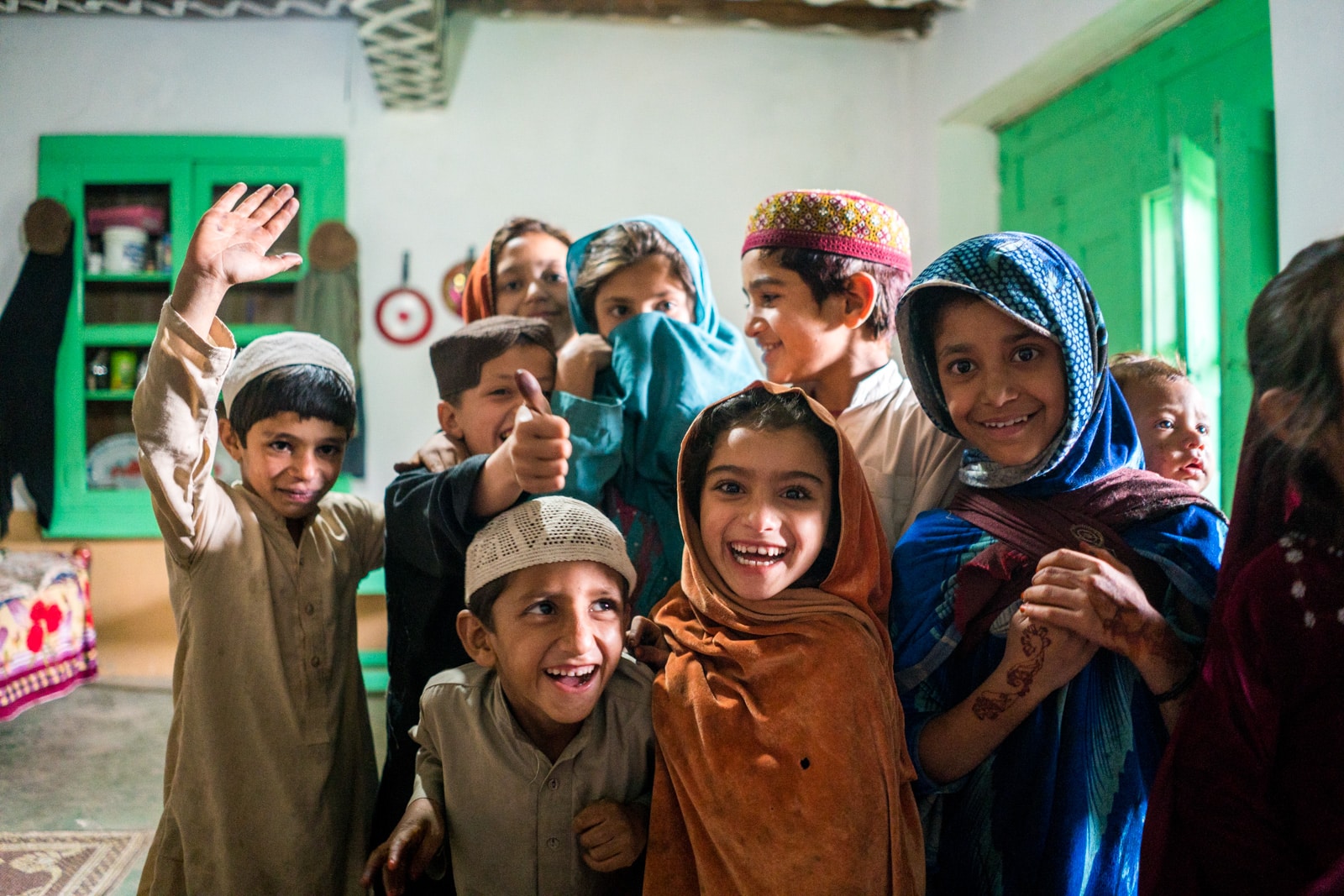
Many of the women were afraid to be in photos, but they were more than happy to have their kids in front of the lens.
Women and wallflowers
Some hours later, I sat with Zainab back in her father’s house, carefully printing the word “F L O W E R”, my name, and my phone number on a piece of paper for her. The sound of shoes crunching gravel announced her father’s coming, and she quickly stuffed the paper under her hijab and into her bra. Bakht entered the courtyard, stalking around for some minutes as all the women present tugged their headscarves lower and stared silently at their feet.
As Bakht exited through the curtain door to return to Al Jazeera with Sebastiaan, Zainab whispered to me, “Brother, school. Me, no school.” She motioned to where the paper was hidden in her clothes, making a sad, strained face before glancing significantly at the place where her father stood moments before. Moments later, the women were all chattering loudly once more.
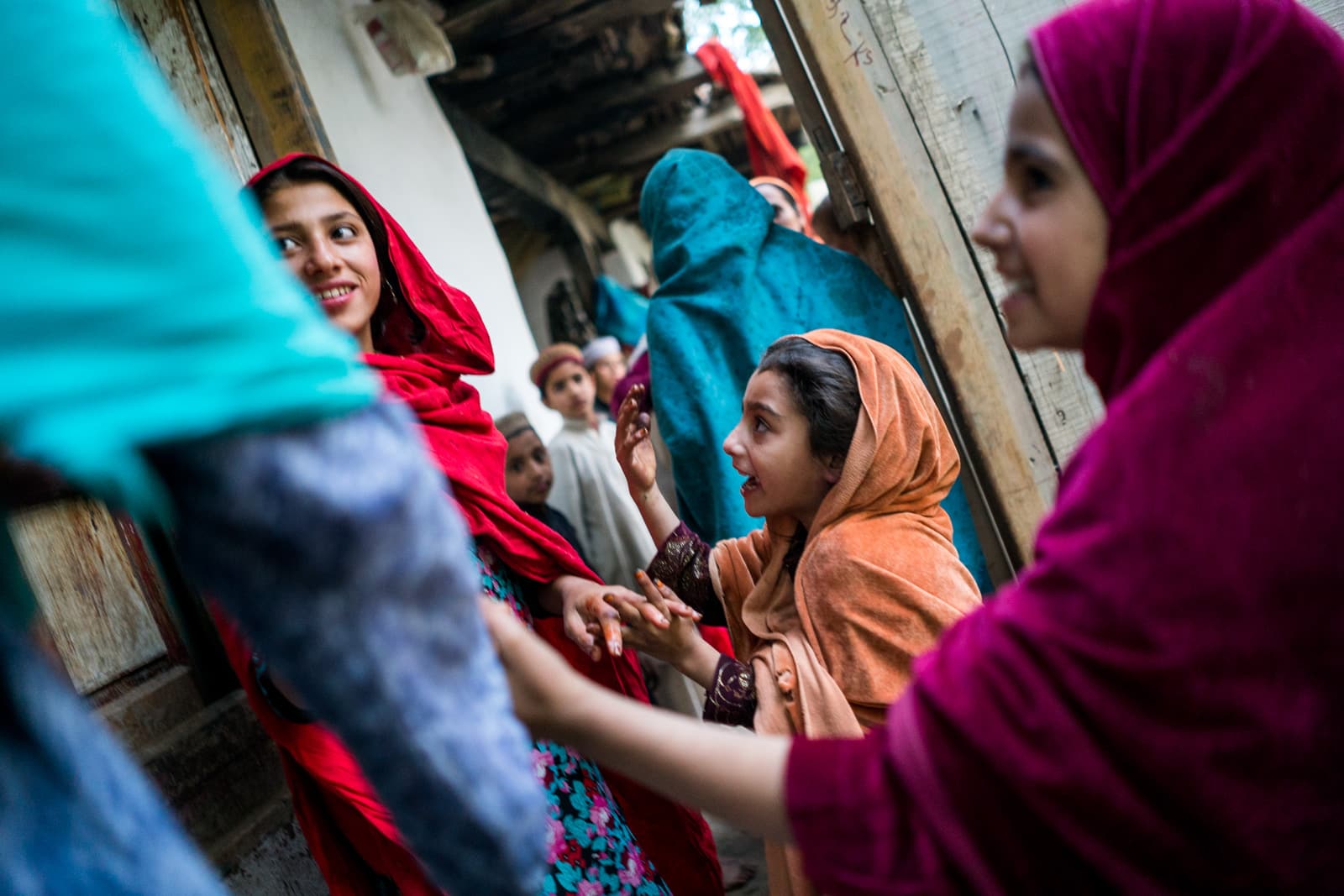
Behind the scenes in Thall
The scene replayed itself countless times that day. When not under masculine surveillance, the women were unstoppable. They cackled at each others’ jokes, showed off their strength by crushing my hands with formidable high fives and handshakes, and did silly things like wrapping me up in their black ghost sheets.
The second Bakht returned, however, the playfulness instantly ceased, and the fiery women were replaced with demure wallflowers once more. Whenever I returned to the guest area of the home, the only signs of the women and girls were eyes peeking curiously through a crack in the door, sneaking glances at Sebastiaan and I.
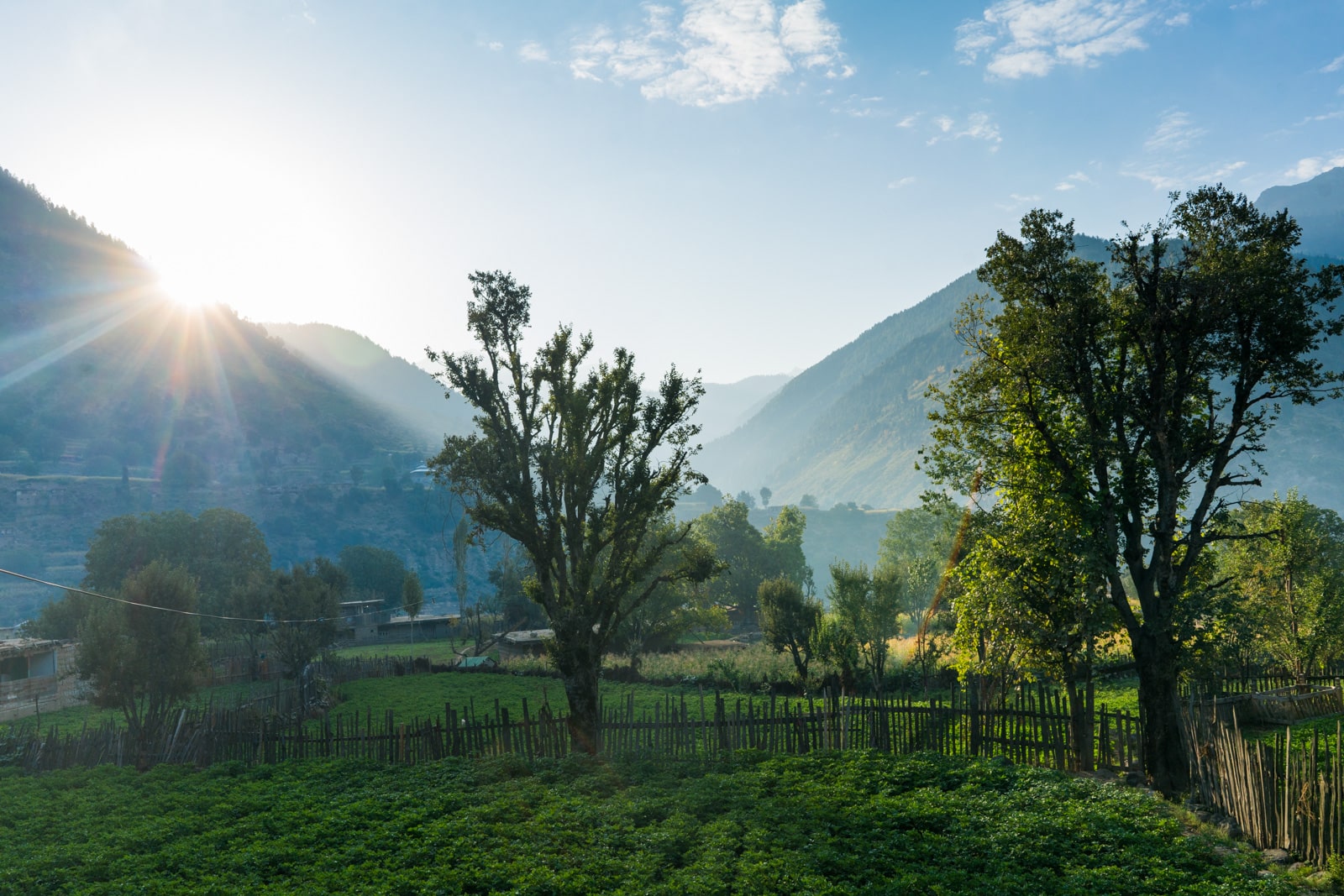
Sunrise over the fields of Thall, Pakistan
What to do?
After months in Pakistan primarily surrounded by men, I was glad to experience life on the feminine side of the divide… but the sentiment was soon lost amidst anger and devastation. It’s one thing to read a book or watch a show about oppressed women, and another thing entirely to see it in action.
I am not a feminist in the contemporary sense. You won’t find me on the streets shouting about women’s oppression, hating men, and banning hijab. I’m a textbook feminist in that I believe women should be equal with men, and have control over their own lives. What a woman does and wears should be her choice, whether she wants to drunkenly pick up boys on the beach in a cheeky string bikini, or face Mecca to worship Allah five times a day in a long black abaya.
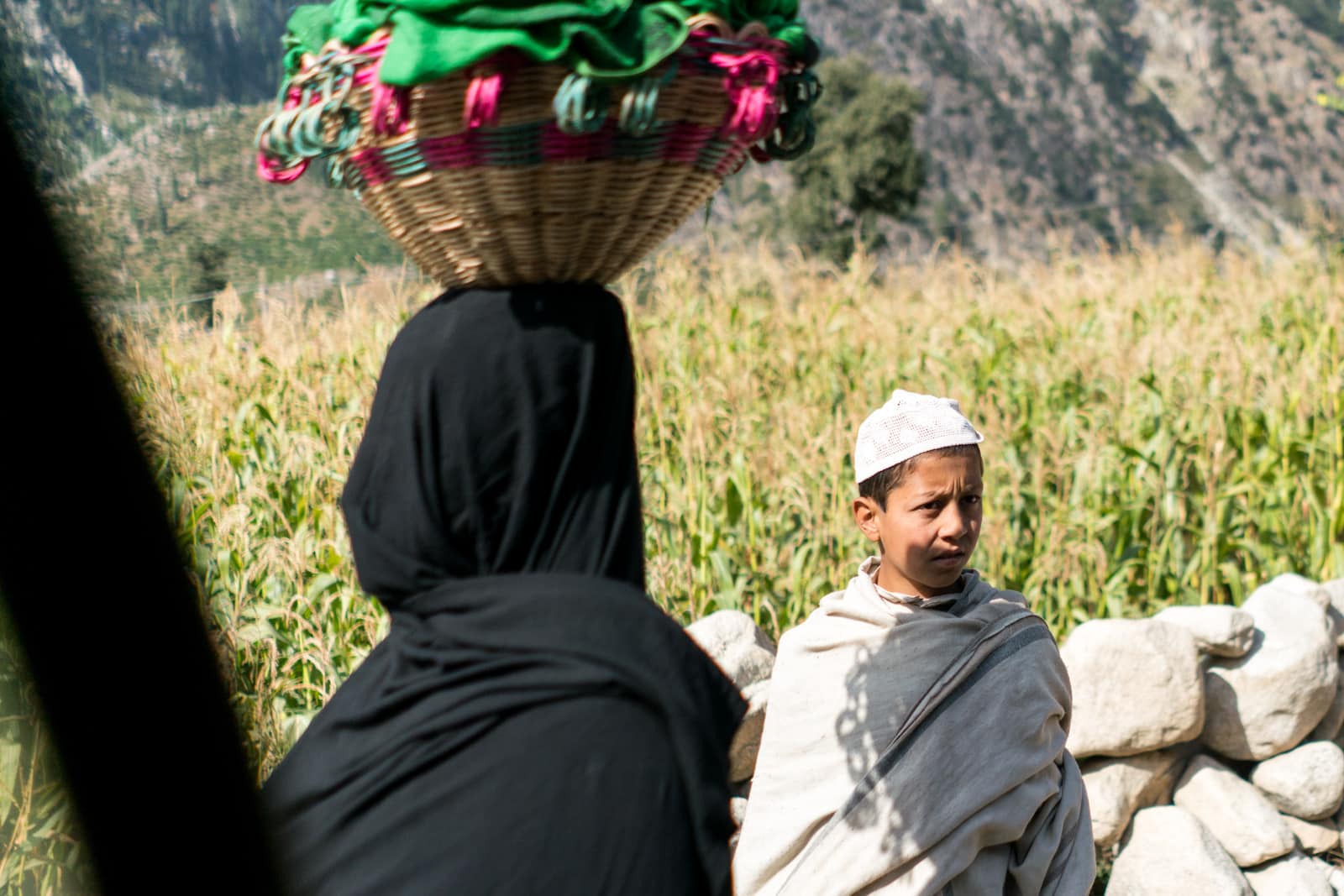
Maybe these women prefer to be protected by men, like staying about the home, and feel safer hiding from prying eyes behind black sheets. Women have told us as much before, but the language barrier was too great to get into such deep discussion with the women.
If that is their choice, so be it. I, as a visitor, cannot apply my own ideals onto someone else’s culture. It’s not my place to dictate how they should live their lives… but I can’t help but think of Zainab’s dismay about not going to school, and be upset over what I saw. How can these women make informed choices and decisions when they’re confined to their homes, prohibited from going to school, and are ultimately subject to the whims of husbands, fathers, and brothers?
For now, there’s not much you or I can do about it, aside from share my experience. I cannot force views on the women or the men—true change comes from within a society, not from outsiders storming in and setting rules. Perhaps with more time, education, and exposure to other peoples, things will gradually evolve to be more equal and open for the women of Thall.
Until then, let this serve as a reminder that countries are often far more diverse and divided than meets the eye. Travel only exposes us to a handful of pieces in a society’s puzzle. Explore and observe, listen and learn, and never assume you’ve seen it all. I’ll be trying to do the same.

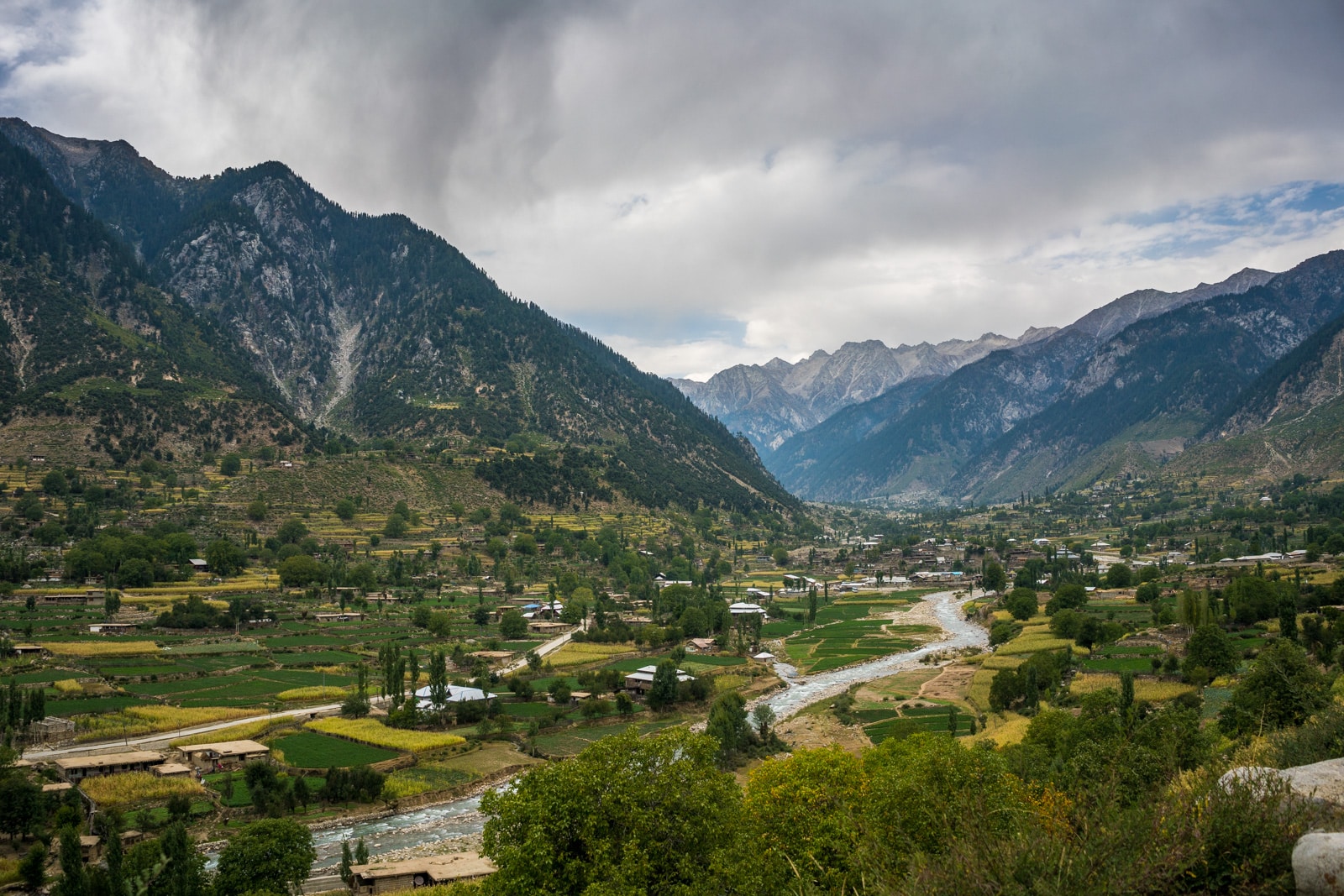


I visited the same place couple of days ago and noticed women working in the fiel with fully covered face with black shawl….
hello
I go to Pakistan quite often as my parents own a pharma company, so I enjoy staying in Islamabad and Chengdu (I also live in China) I was told about an uncle who was living in a rural part of Rawalpindi they owned extensive agricultural lands, and farmhouses.
I went to live there, my uncle had three sons two daughters who were about 20/23 and the males were older 25 (I was 25 at the time if I recall correctly, and he is about the same age as me) the older one was in his mid to late 30s and his sisters they’d only been into the city when they had to see the doctor or had other engagements I was shocked to hear this from them, that they hardly left the car when on rare occasions they went out, as both my sisters in England were, very successful pretty much everyone in my family is successful, I’m just freeloading a lot of the time off them ala, champagne, cigars and caviar, and the occasional powdering of the nose (my wife’s going to read this, I think I’ll be in the doghouse lol) if it isn’t Cristal I’ll rather drink Moet or Tattinger.
The younger brother of my cousin sisters who was a similar age to me was a moron, he was paranoid (since he was smoking hashish (weed) all the time) and would get so aggressive with his sisters if they talked to me, which was very unusual for me, he didn’t want me talking to them, as my cousins were quite inquisitive, about my family’s lifestyle in England. He would join in and start bashing my family for being too secular (basically he was a racist) which pissed me off.
As I was born and educated in England one day I decided to take my cousins out, their mother was a little apprehensive initially, that her husband (my uncle) might find it objectionable not that I cared, however at the same time I didn’t want to get my cousin sisters in trouble.
My cousin sisters told stories of the village girls and, as well as tell me so and so has a crush on me, it was a little comical since most of them knew I had a girlfriend and I’m not exactly going to be blown away by a village girl, but they still wanted to hook me up with a Pakistani girl who was living in Abu Dhabi (a family friend of theirs) eventually I did end up marrying the Pakistani girl from Abu Dhabi we have two little boys, and she is a scientist doing research at CERN.
I, digress.
Coming back to what I was alluding, I drove my cousin sisters to the city. While we were doing our shopping, their brother had found us his mum told him where we had gone, so like an unwanted guest, he turned up.
I could hear him muttering under his breath, something about showing his sisters to the public and no one will want to marry them. He kept saying I’ve lifted their veil not a literal veil but a metaphorical one, some silly idea that now men have looked at them, they’ve become ‘unclean’.
At this point, I just lost it, because he was trying to open the doors of the car so he can hit his sisters for not covering their hair, to be honest with you, I wasn’t 100% sure if he had a handgun on him, he was making such, a scene and using disgusting language in front of a crowd who had gathered by now due to his shenanigans.
I walked up to him and whispered in his ear: “Cut the bullshit!” (bakwas chor da) at this point he grabbed my shirt luckily the buttons ripped off and he lost his grip, I remember him saying something like: “you’re punching me?” back in those days, most Pakistani guys didn’t know how to fight, their idea of fighting was slapping the other person, and I’d been sent to afterschool classes in England to learn boxing and Muay Thai as well as Cricket, Shooting, and Archery, I only enjoyed shooting and archery.
Don’t get me wrong, I’m not a big guy, I’m a typical metrosexual guy that (weigh as much as 56kg) is why I was hesitant at first since he appeared very, very aggressive from his body language.
After I put him in a Muay Thai clinch he stopped acting aggressively (if you’ve ever been in a Muay clinch you’ll understand), as soon as I let him go, he started being aggressive again, even picked up a brink and threatened to hit me with it at which point that was a green light for me to put him in a wristlock in my mind I had decided I’m going to break his wrist or arm as I was very angry at that point. I grabbed him and luckily for him the crowd pulled me off him, and they were holding me giving him a chance to take free swings at me, they let go of me I’d had enough I used a Muay Thai kick to his leg and flattened him sprawled out, he didn’t walk properly for about 2 days.
Unforently, for years I tried to convince my cousin to change his thinking, it never worked, until he moved to Sweden, I remember his wife telling my wife, that he is always blaming her mother because his wife worked. And he didn’t want his wife to work. However, he has changed his mind and doesn’t act like he used to. We’ve had a couple of drinking sessions together and ironed out most of the issues. He has stopped drinking, and become a little more Sufi type, which is good, as he was religiously conservative before.
I enjoyed reading the blog you mentioned somewhere, to be an Atheist in Pakistan, I used to be an Atheist, although due to my Fraternal/Masonic link I am a Cultural Muslim.
I’ve not had any problems, we’ve discussed this with my friends in Pakistan. It isn’t something I’d discuss with random people, for example, with anyone who doesn’t have at least a high school education in Pakistan. My parents are practising Sunni Muslim, and I don’t want to hurt their feelings I think sometimes one has to be sensitive. So I also don’t discuss it with them.
As long as you haven’t been a Muslim before, being an Athiest in Pakistan isn’t an issue from my experience, many Pakistanis in Gilgit and the Northan Areas are Agnostic and Animists. Some of the beliefs even overlap like Animism and Sufism (namely Sufi Shrines) in Pakistan. Visting some of the Sufi shrines is eye-opening in a spiritual way, I never considered myself spiritual, until I read the Talmud and Torah, gained an understanding of Kabbalah and Sufism.
Sorry, I tend to type quite fast, I’ve written so much barely proofread it. Apologies about the terrible grammar I’m dyslexic.
Once again thanks for the blog.
Alex, I am glad you got to experience some time with off the beaten path village females. It just becomes sad when they immediately tone down their feistiness when the patriarch enters the room. & that young lady should’ve been able to go to school! I had hoped to come to Pakistan, namely Ralwalpindi, but my main contact is entering into an arranged marriage, and our correcpondence is next to nothing now. He would’ve been the only person I knew there. Maybe something else will happen….
Crazy it may sound but currently there are thousands of tourists (mostly westerners) stranded in Nepal due to Covid-19 pandemic. They are staying illegally because Nepali government has decided not to extend their visa even when they are willing to pay visa fee and wait out until things are back to normal. Those fortunate enough to board any rescue flights are made to wait for few days at immigration office in Kathmandu to find out who much fines to pay. Their passports are also stamped stamped for overlay stamp with noting that they are barred entry into Nepal for one year.
Good.